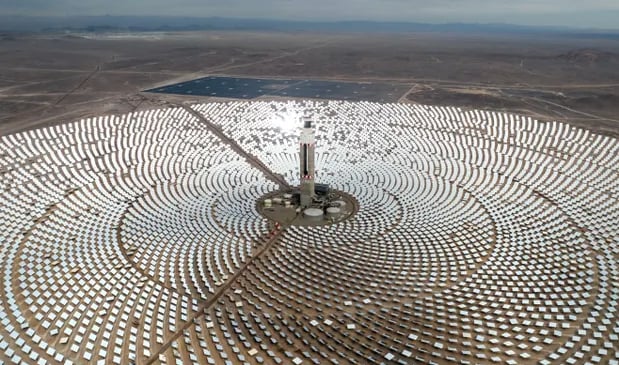June 17, 2025 | 13:07 GMT +7
June 17, 2025 | 13:07 GMT +7
Hotline: 0913.378.918
June 17, 2025 | 13:07 GMT +7
Hotline: 0913.378.918

The Cerro Dominador solar plant in the Atacama desert, Chile. The report says the funding figure would enable a global transition to green energy. Photograph: John Moore/Getty Images
About $2tn (£1.75tn) will be needed each year by 2030 to help developing countries cut their greenhouse gas emissions and cope with the effects of climate breakdown, new data suggests.
The cash will be needed so that poor countries can switch away from fossil fuels, invest in renewable energy and other low-carbon technology, and cope with the impacts of extreme weather, according to a report that was commissioned jointly by the UK and Egyptian governments, and presented at the Cop27 UN climate summit.
The figures, which would cover the needs of all of the world’s developing economies except China, are far higher than any climate finance that has yet been forthcoming to help poor countries.
“Around half of the required financing can be reasonably expected to come from local sources, from strengthening domestic public finance and domestic capital markets, including tapping into large pools of local finance that national development banks are able to mobilise,” the report says.
However, external finance, as well as the World Bank and other multilateral development banks, must also play a key role.
Nicholas Stern, the climate economist who wrote a landmark 2006 review of the economics of climate change, was a lead author of the report. He said: “Rich countries should recognise that it is in their vital self-interest, as well as a matter of justice given the severe impacts caused by their high levels of current and past emissions, to invest in climate action in emerging market and developing countries.
“Most of the growth in energy infrastructure and consumption projected to occur over the next decade will be in emerging market and developing countries, and if they lock in dependence on fossil fuels and emissions, the world will not be able to avoid dangerous climate change, damaging and destroying billions of lives and livelihoods in both rich and poor countries.”
Funding low-carbon economic growth in poor countries would help to lift billions of people out of poverty, create jobs and reduce greenhouse gas emissions.
The money is also needed to help poor countries adapt to the effects of the climate crisis, for instance by building more robust infrastructure, and protections such as seawalls and early warning systems. For the most severe impacts of climate breakdown, which countries cannot adapt to, known as loss and damage, the money would help to rescue those at risk, repair vital infrastructure and help to heal the social fabric – services such as health and education – of countries torn apart by extreme weather, such as devastating floods, droughts, storms and heatwaves, that is likely to worsen as a result of climate breakdown.
Loss and damage is one of the main priorities for discussion at the Cop27 summit in Sharm el-Sheikh, which
Poor countries have been promised since 2009 that by 2020 they would receive at least $100bn a year to help them cut emissions and cope with the impacts of extreme weather. But that target has repeatedly been missed, and is not likely to be fulfilled until next year.
Lord Stern said: “Given the pressure on public budgets in all countries, the role of the multilateral development banks, including the World Bank, will be critical in increasing the scale of external finance for emerging market and developing countries, and bringing down the cost of capital for investors. The flow of finance from these institutions should triple from about $60bn a year today to around $180bn a year within the next five years. This requires a strong sense of direction and support from the country shareholders, and real leadership from the top of these institutions.”
The World Bank has come under increasing criticism in recent months for its perceived failures to direct sufficient funds towards the climate crisis. The Bank will engage in discussions at Cop27.
(The Guardian)

(VAN) Extensive licensing requirements raise concerns about intellectual property theft.

(VAN) As of Friday, a salmonella outbreak linked to a California egg producer had sickened at least 79 people. Of the infected people, 21 hospitalizations were reported, U.S. health officials said.

(VAN) With the war ongoing, many Ukrainian farmers and rural farming families face limited access to their land due to mines and lack the financial resources to purchase needed agricultural inputs.

(VAN) Vikas Rambal has quietly built a $5 billion business empire in manufacturing, property and solar, and catapulted onto the Rich List.

(VAN) Available cropland now at less than five percent, according to latest geospatial assessment from FAO and UNOSAT.

(VAN) Alt Carbon has raised $12 million in a seed round as it plans to scale its carbon dioxide removal work in the South Asian nation.

(VAN) Attempts to bring down the price of the Japanese staple have had little effect amid a cost-of-living crisis.